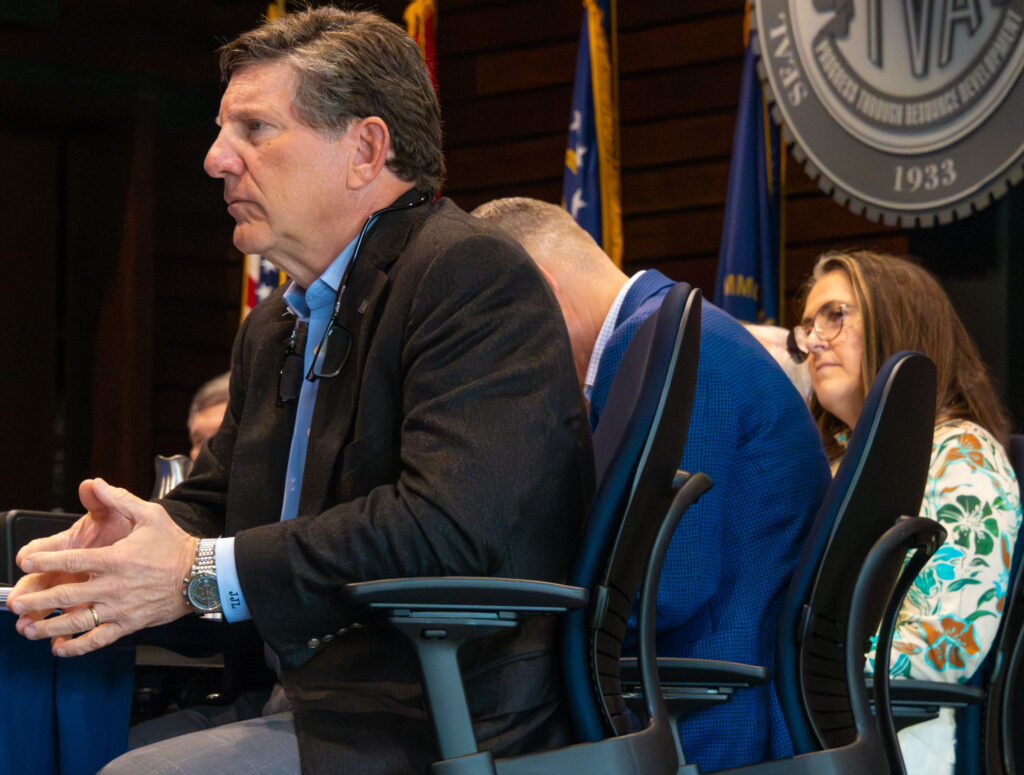
Dozens of people spoke in front of the Tennessee Valley Authority Board of Directors earlier this month.
The event was a “listening session” — a time for members of the public to speak directly to the TVA Board, which is the main regulator of TVA. Listening sessions are not streamed or made public after they occur, so WPLN News did an analysis of the speakers at the May 8 meeting.
The TVA Board has just four gatherings per year, split between two meetings, in locations across the Valley. The listening sessions are one of the only opportunities for people outside the TVA system to connect with the board. (Technically, however, anyone can reach the TVA Board anytime by emailing [email protected].)
This month, the bulk of speakers commented on TVA’s plans to expand its fossil fuel infrastructure. TVA is on track to construct eight methane gas plants by the end of the decade — which will have serious consequences for the climate and people’s health.
About one-third of the speakers were representatives of the energy industry. This lineup included eight people from local power companies, two heads of power associations that represent local power companies, one person tied to the coal industry, and one person from the solar industry.
To speak at the meeting, people can start signing up at a specific time a week in advance. TVA said they pick the order of speakers based on the order they register online.
Most of the energy industry representatives spoke in ways that mirrored TVA’s messaging. Seven of the energy speakers, plus one person from a packaging corporation, spoke explicitly in support of TVA’s fossil fuel expansion.
But there was one contradiction that highlights the limited viewpoint presented to the TVA Board: The Tennessee Municipal Electric Power Association represents about 50% of TVA’s local power companies, including the Nashville Electric Service, and its director spoke in support of TVA’s gas projects.
“As TVA moves away from coal, many decisions will need to be made and many factors will need to be taken into consideration,” said TMEPA director Brian Solsbee. “TVA’s recent decision to replace Kingston with 1,500 megawatts (of gas plants) and along with 100 megawatts of battery storage and four megawatts of solar offers flexibility and reliability.”
But this comment does not reflect the views of NES.
Last year, the NES Board passed a resolution that advised TVA to reconsider its Kingston gas plans in favor of a solar and battery option. The NES Board wrote that a solar project would create opportunities for jobs, federal incentives and construction dollars, make Nashville more competitive with other big cities due to less climate pollution, and reduce financial risks for residents.
NES told WPLN News that its views have not changed since last year.
Nashville’s power provider is the second-largest of TVA’s 153 local power companies, nearly all of which are locked into evergreen contracts with TVA. NES accounts for 8% of TVA’s total electricity sales.
More: From nose bleeds to cancer: The public health risks of TVA’s gas buildout | WPLN News
During the listening session, some people made comments about topics unrelated to the gas buildout, like bridges or gratitude for TVA’s financial support of community partner programs.
Four agricultural representatives made comments. Two of them — Rob Robertson, who is part of a TVA advisory council, and Jai Templeton, the former commissioner of the Tennessee Department of Agriculture — spoke against solar on agricultural land.
There were also 17 people, a mixture of residents and climate advocates, who spoke against either TVA’s Cheatham County gas project in Ashland City or the gas buildout entirely.
“There is nothing you could do more important than move off gas towards renewable energy,” said environmentalist, author and Third Act founder Bill McKibben.

